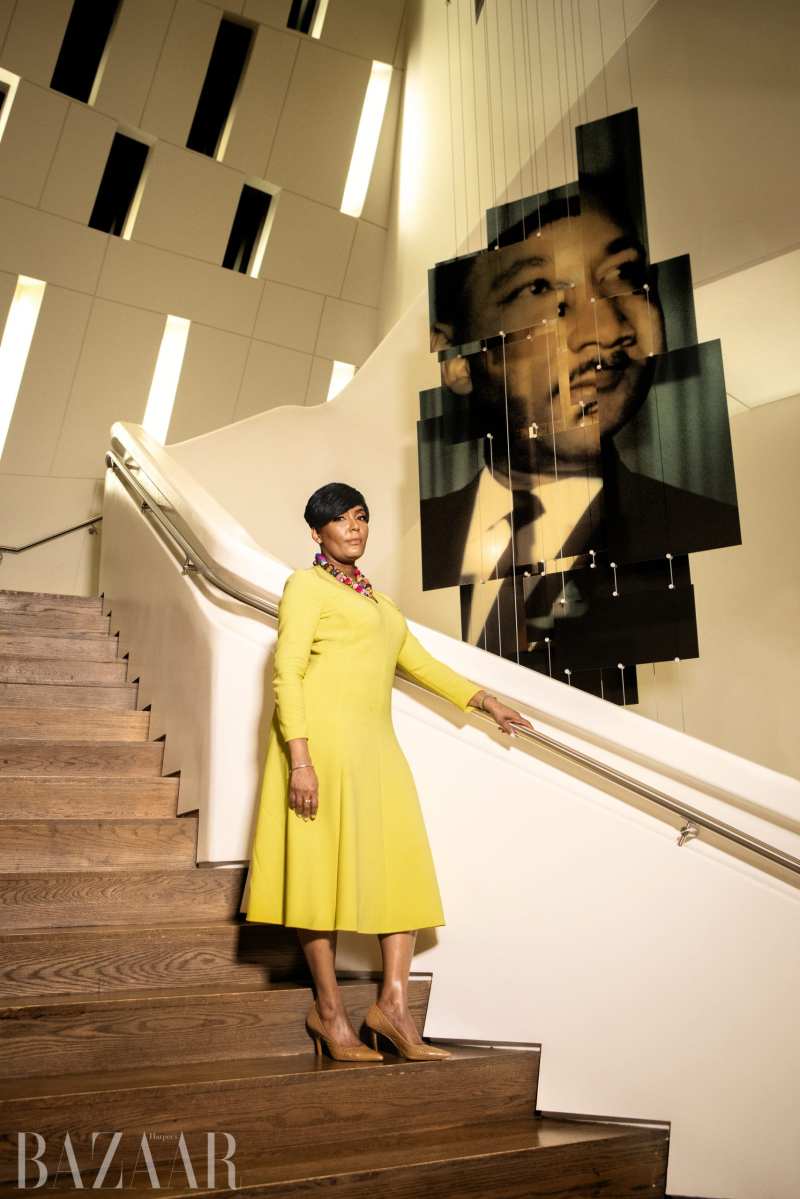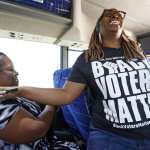In the waning days of summer, in a year that feels at once lost and consequential, Keisha Lance Bottoms has escaped from Atlanta. Sitting in the sunshine at her undisclosed retreat, surrounded by green trees and grass and casually dressed in a denim shirt, the city’s 60th leader is smiling and relaxed, looking younger than both her 50 years and what the past five months of her life as a mayor, mother, coronavirus survivor and Black woman in America would suggest.
When we spoke in late August, Bottoms was a woman between storms. She had just weathered the pandemic’s battering of her hometown, which has included a battle with Georgia’s Republican governor, Brian Kemp, over their differing responses to the coronavirus. The state’s reopening has meant a fragile and cautious recovery for Georgia’s capital city, and Bottoms is bracing for an expected surge this fall that will likely coincide with the November election—adding a new quandary to the pandemic, as voters attempt to navigate the democratic process in the midst of a public health crisis.
The mayor—a mother of four, including three sons—has also faced the national reckoning on race. The issue of systemic racism around policing in communities of color hit home not only on the streets of her city after the fatal shooting in June of an unarmed Black man, Rayshard Brooks, by Atlanta police but also in her kitchen, in the form of her eldest son Lance’s righteous anger and having to confront her own fears about her ability to keep him safe. Indeed, the realities of both pandemics arrived at her doorstep: Despite taking precautions, Bottoms; her husband, Derek Bottoms; and one of their children all tested positive for COVID-19 this summer. They have since recovered from the virus, but the scars of racism linger.
On top of it all, Bottoms, an early surrogate of 2020 Democratic presidential nominee Joe Biden, was the only mayor and one of several Black women on the shortlist to be his vice-presidential pick before California Sen. Kamala Harris got the nod. Now Bottoms is eyeing her own political future, with a looming mayoral reelection contest ahead next year. But for the moment, she says she’s relieved.
“I can say that the veepstakes, that was pretty stressful. The process is as daunting as you’ve ever heard … every single thing you’ve ever done and said is looked into, and you are called upon to recall some stuff that you don’t even remember or hadn’t thought about, in my case, since high school — literally!” Bottoms said. “I’m obviously disappointed that it wasn’t me, but I said repeatedly, I wanted him to choose the person he thought would best help him defeat Donald Trump. But I was surprised at the relief I felt. I didn’t know I was carrying it so heavy in my heart and on my shoulders.”
Any one of these daunting challenges would’ve been enough on their own, but to confront them all at once has tried Bottoms’s faith and leadership in so many ways. She has admittedly emerged from the crucible of the past several months worn but says she is steeled for the work and fights ahead, propelled by what the Rev. Martin Luther King, Jr., referred to as “the fierce urgency of now.”
“The one thing that I’m very much aware of is, we don’t have the luxury of time. If anything, that is what we’ve learned from this moment. There’s a tendency for government to move slowly, but we don’t have the luxury of moving slowly on anything,” Bottoms said. “The biggest challenge is prioritizing what can happen now, and then having the patience to continue to move forward on the things that will have to happen later.”
Back in early March, Bottoms was enjoying spring break with her children when the pandemic descended upon Atlanta. Bottoms was already seeing it in her Southwest Atlanta community among friends and friends of friends. At one point she said she remembered personally knowing as many as 20 people who were either sick or had lost a loved one, and watching the news, thinking that the numbers couldn’t be right. “I came to realize a couple of things,” she said. “One, African-Americans were getting hit hard and fast, immediately. The other thing was, our numbers in Georgia very likely weren’t accurate. I’m not a mathematician, but if I know 20 people and I’m looking at this number, and they’re saying 1,000 people have tested positive in the state, it’s just no way in the world I could know this many people who are impacted by COVID-19.”
By mid-March, City Hall was closed, and businesses in Atlanta were shuttering. Other cities across the state began to follow Atlanta’s lead, and many large jobs centers also decided to close. Bottoms was coordinating with Governor Kemp’s office, but he was reluctant to order a statewide shutdown, and was among the last of the state leaders to do so. The mayor said she told her team, “Just assume you’re going to go it alone.”
What Bottoms wasn’t prepared for was a direct confrontation with Kemp, who sued her personally, as well as the Atlanta City Council, in July, for enacting a mask mandate for the city, despite the fact that Bottoms wasn’t the only mayor in the state to order one. The optics along racial and gender lines were not lost on Bottoms, leader of a city thought of by many as the heart of Black America. (Kemp has since withdrawn the lawsuit.) Asked whether her being a Black woman made her a target of the governor, with whom she previously said she had a good working relationship, Bottoms offered: “It’s very difficult not to feel as if that was a factor.”
“When I did it, literally all hell broke loose, in terms of the governor’s response,” Bottoms said of the mask mandate. “I truly believe I’ll have a higher being to answer to on my response on COVID-19 and whatever bumps and bruises come along with standing up for what I know to be the right thing. I’m going to do it every day of the week.”
Navigating the unrest around racial disparities in policing has posed an equally daunting task for Bottoms. The killing of 46-year-old George Floyd, who died on May 25 after a Minneapolis police officer kneeled on his neck for more than eight minutes, launched protests in cities across the country urging an end to the unrelenting killing of unarmed Black people in America. Atlanta, nicknamed “The City Too Busy to Hate” in the 1950s by progressive mayor William B. Hartsfield, and regarded today as a bastion of Black business and political success, was not immune to the fight — which laid bare the reality that the city is also among the most segregated and unequal in the country.
A lot of the anger and sentiment that you see on the street, I’d get it in my kitchen.
On May 29, protests in Atlanta turned from peaceful to hostile, as an angry young crowd descended on the city’s iconic CNN Center and began destroying its facade. Police cars burned and tensions with law enforcement were heightened. It was a scene that seemed particularly surreal in Atlanta, where racial harmony has become a calling card.
Later that night, Bottoms called an emergency press conference, convening Atlanta’s old and new guard, including the daughter of Martin Luther King, Jr., Dr. Bernice A. King, and entertainers like Clifford “T.I.” Harris and Michael “Killer Mike” Render. With tears in her eyes, her voice shaking, Bottoms took the podium. “If you love this city — this city that has had a legacy of Black mayors and Black police chiefs and people who care about this city, where more than 50 percent of the business owners in metro Atlanta are minority business owners — if you care about this city, then go home,” Bottoms said.
The mayor had also been pleading with her 18-year-old son, Lance, who had been watching the unrest unfold and has come of age in the era of Black Lives Matter, his life bookended by the tragic killings of Trayvon Martin and Breonna Taylor. Mother and son have talked often about the racial reckoning, Bottoms said, and on the night Atlanta erupted, he was among those in her city she was trying to keep safe. “I didn’t have to catch up and wrap my mind around the sentiment,” Bottoms said. “My son has said to me, ‘You have no idea how hard it is to be a Black boy in America.’ I’ve seen that hurt and pain, and I’ve had to have these conflicting conversations with him about being assertive and being confident and standing your ground. Except under these circumstances [in encounters with police], fade away, don’t bring attention to yourself, be compliant. A lot of the anger and sentiment that you see on the street, I’d get it in my kitchen, from him. When things started bubbling up, he wanted to go downtown, but I was looking at it on television and I knew it didn’t look like anything I’d ever seen in Atlanta. I could just feel that it was turning. I absolutely was worried for him. At the end of the day, when he walks out the door, he doesn’t have on a sign that says, ‘I’m the mayor’s son.’ He walks out the door as my Black man-child in America, with all of the risk and vulnerabilities that come along with that.”
Two weeks later, 27-year-old Rayshard Brooks was shot and killed by Atlanta police after he was found asleep in his car in the drive-through line of a Wendy’s restaurant, ripping open racial wounds anew. Bottoms said that much of the summer had been an exercise in soul-searching, of asking how and whether the city was complacent — or complicit — in perpetuating systemic inequality around policing. “There is a reckoning that’s happening in our cities, and we’re seeing it play out in our streets. And it’s important that we have leadership across this country that’s able to speak to this moment in time,” Bottoms said. “These are some very difficult questions we’ve had to ask ourselves. And unfortunately for us in Atlanta, it’s been on the other side of a tragedy. But I believe, in true Atlanta fashion, that the work we are doing in Atlanta and the way we are doing it will and can be a model for other cities to follow.”
“The Atlanta Way” — the unspoken code in the city that is the foundation of its progress and prestige — has been tested this year in the dual pandemics but also politically. During the course of the coronavirus crisis, Atlanta lost three civil rights icons: the Rev. Joseph Lowery, the Rev. C.T. Vivian, and Congressman John Lewis. All had been crucial for decades to the city’s Black political machine, which has produced an unbroken line of Black mayors that has stretched for nearly half a century. Their losses came amid threats of voter suppression headed into the November election that were previewed in Georgia’s primary in June, which saw hours-long lines at precincts across Atlanta, many of them in Black neighborhoods.
Bottoms said that her focus is now on voter turnout in numbers that will result in a win as a mandate, not on the margins. But she acknowledges concern that the pandemic and attempts to depress the vote could jeopardize Democrats’ hope for victory.
“People are out of work, people are sick, their loved ones are dying. They don’t think voting matters to them, so why even bother?” Bottoms said, adding that men like Lowery, Vivian, and Lewis were among “the cornerstones of our village.
“They did the work and they left it all for us to follow,” she continued. “It’s easy and simple to be angry and destructive, but it takes some thought and discipline to organize and to mobilize, and to articulate what your grievances are. They left with us the blueprint for that, and it’s up to us to pick up the baton and keep running the race.”
With the vice-presidential process now behind her, Bottoms is focused on her race for reelection in 2021, which she said had been her plan, despite the detour into national politics. The Atlanta Way will be tested again next year. She won her 2017 election in a runoff against a white woman, former Atlanta City Council member Mary Norwood, by only 821 votes — a margin that Bottoms said is reflective of the city’s demographic shift, which has ushered in a change in attitude and perspective.
“I truly believe that it is the most appropriate time to have an African-American woman lead Atlanta, but I certainly can’t rest on that,” said Bottoms, who adds that she believes the Atlanta Way is still alive and well.
“It’s the reason I’m mayor,” she said. “I don’t know of any other city that has it the way we have in Atlanta. If we don’t remind people that this is more than shine in Atlanta, that there is a responsibility to uphold who we are and this legacy as a city … Atlanta will be known for lemon pepper wings and great strip clubs if we’re not careful. There’s a requirement of substance in this city, and it’s incumbent upon all of us to stress that — not just to our CEOs, but to anybody who wants to call this place home.”
This story was co-published with Harper’s Bazaar.







